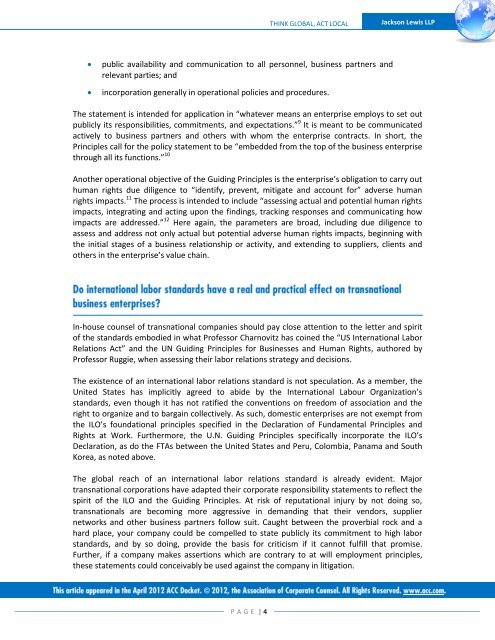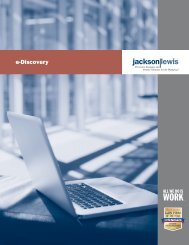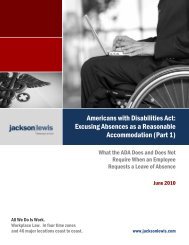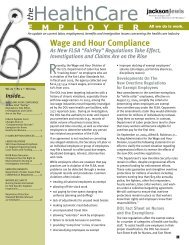Think Global, Act Local - Jackson Lewis
Think Global, Act Local - Jackson Lewis
Think Global, Act Local - Jackson Lewis
You also want an ePaper? Increase the reach of your titles
YUMPU automatically turns print PDFs into web optimized ePapers that Google loves.
THINK GLOBAL, ACT LOCAL<strong>Jackson</strong> <strong>Lewis</strong> LLPpublic availability and communication to all personnel, business partners andrelevant parties; andincorporation generally in operational policies and procedures.The statement is intended for application in “whatever means an enterprise employs to set outpublicly its responsibilities, commitments, and expectations.” 9 It is meant to be communicatedactively to business partners and others with whom the enterprise contracts. In short, thePrinciples call for the policy statement to be “embedded from the top of the business enterprisethrough all its functions.” 10Another operational objective of the Guiding Principles is the enterprise’s obligation to carry outhuman rights due diligence to “identify, prevent, mitigate and account for” adverse humanrights impacts. 11 The process is intended to include “assessing actual and potential human rightsimpacts, integrating and acting upon the findings, tracking responses and communicating howimpacts are addressed.” 12 Here again, the parameters are broad, including due diligence toassess and address not only actual but potential adverse human rights impacts, beginning withthe initial stages of a business relationship or activity, and extending to suppliers, clients andothers in the enterprise’s value chain.In-house counsel of transnational companies should pay close attention to the letter and spiritof the standards embodied in what Professor Charnovitz has coined the “US International LaborRelations <strong>Act</strong>” and the UN Guiding Principles for Businesses and Human Rights, authored byProfessor Ruggie, when assessing their labor relations strategy and decisions.The existence of an international labor relations standard is not speculation. As a member, theUnited States has implicitly agreed to abide by the International Labour Organization’sstandards, even though it has not ratified the conventions on freedom of association and theright to organize and to bargain collectively. As such, domestic enterprises are not exempt fromthe ILO’s foundational principles specified in the Declaration of Fundamental Principles andRights at Work. Furthermore, the U.N. Guiding Principles specifically incorporate the ILO’sDeclaration, as do the FTAs between the United States and Peru, Colombia, Panama and SouthKorea, as noted above.The global reach of an international labor relations standard is already evident. Majortransnational corporations have adapted their corporate responsibility statements to reflect thespirit of the ILO and the Guiding Principles. At risk of reputational injury by not doing so,transnationals are becoming more aggressive in demanding that their vendors, suppliernetworks and other business partners follow suit. Caught between the proverbial rock and ahard place, your company could be compelled to state publicly its commitment to high laborstandards, and by so doing, provide the basis for criticism if it cannot fulfill that promise.Further, if a company makes assertions which are contrary to at will employment principles,these statements could conceivably be used against the company in litigation.P A G E | 4








